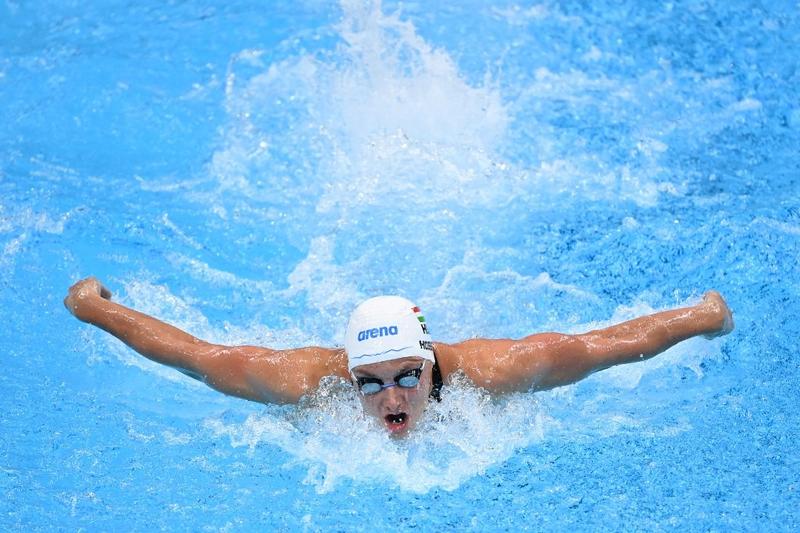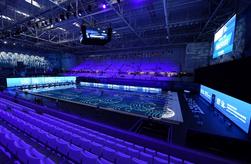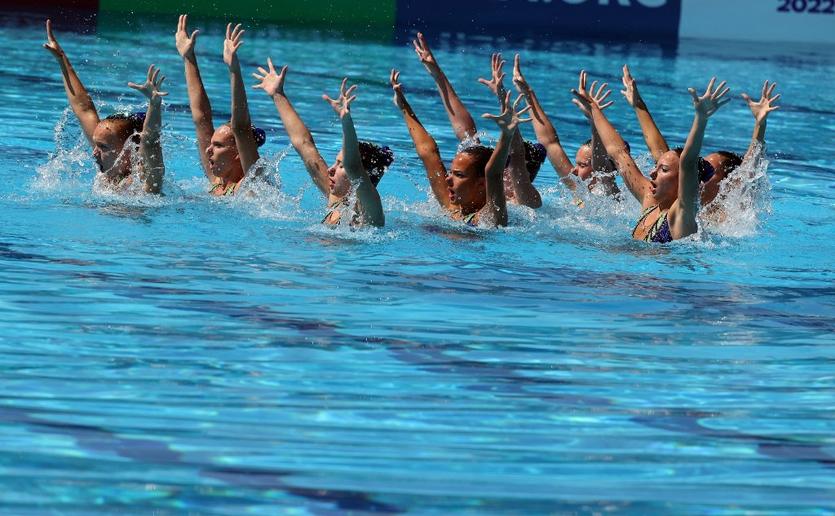 Hungary's Katinka Hosszu competes in a semi-final of the women's 200m individual medley swimming event during the Tokyo 2020 Olympic Games at the Tokyo Aquatics Centre in Tokyo on July 27, 2021. (JONATHAN NACKSTRAND / AFP)
Hungary's Katinka Hosszu competes in a semi-final of the women's 200m individual medley swimming event during the Tokyo 2020 Olympic Games at the Tokyo Aquatics Centre in Tokyo on July 27, 2021. (JONATHAN NACKSTRAND / AFP)
Katinka Hosszu, Krisztina Egerszegi, Tamas Darnyi, the Hungarian water polo team-all names that are synonymous with gold medals in the pool, an incredible accomplishment by a relatively small landlocked European country with a population of barely 10 million.
Nowadays, "little" Hungary is a major player at any international swimming meet-and there are plenty more young talents for the future in the pipeline.
Four-year-old Stefania, for instance, already spends an hour each day in the water at a swimming complex in Budapest's 11th district.
One of the keys to Hungary's success at elite level is its National Swimming Program (UNP), operated by the Hungarian Swimming Association
Her achievement today: to completely submerge her head underwater without swimming goggles, and without tears.
Taking children swimming in Hungary is as natural as taking them skiing in Austria, or for Canadian kids to play ice hockey.
"It is absolutely normal for us that every child should learn to swim," Stefania's mother, Ildiko Muller, told Xinhua. "It is like learning to read or write, or to ride a bicycle."
Ildiko takes some time to work on her tan and read a magazine during her daughter's one-hour lesson.
Stefania attends private lessons, but the little girl could have chosen to go swimming with her kindergarten class.
ALSO READ: Croatia beats host Hungary to win water polo world title
One of the keys to Hungary's success at elite level is its National Swimming Program (UNP), operated by the Hungarian Swimming Association.
 A picture shows a general view of the pool during the LEN European Aquatics Championships at the Duna Arena in Budapest on May 22, 2021. (ATTILA KISBENEDEK / AFP)
A picture shows a general view of the pool during the LEN European Aquatics Championships at the Duna Arena in Budapest on May 22, 2021. (ATTILA KISBENEDEK / AFP)
Some say that to be a good swimmer is in Hungarians' genes, but top-notch swimming complexes like the FINA event's main venue, the Duna Arena, and a large network of other centers that popped up recently, underline how seriously the sport is taken in Hungary
The UNP is a unique and comprehensive program that organizes swimming lessons for preschool and elementary school kids up to the third grade.
The long-term goal of the program is to encourage children to lead healthy lifestyles and thereby improve their quality of life.
The medium-term goal is for all children to have the opportunity to learn water-safe swimming by Grade 3 in elementary school.
"The children convinced me to join this program," local swimming legend Egerszegi said in an interview with the Mandiner newspaper ahead of the 19th FINA World Championships. "It's really all about teaching all toddlers to swim confidently within an organized setting, from preschoolers to third-graders. What really catches me is that even children who would never normally have the opportunity to learn to swim can do so."
ALSO READ: Ex-chief of Hungary's swim federation held in 1998 slaying
The 47-year-old Egerszegi is a former world-record holder and one of the greatest Hungarian Olympic champions of the modern era.
She is the first female swimmer to win five individual Olympic gold medals, and the second swimmer after Australian Dawn Fraser to have won the same individual event at three consecutive Olympic Games (1988, 1992 and 1996).
She held the world record in the long-course 200m backstroke for almost 17 years.
Some say that to be a good swimmer is in Hungarians' genes, but top-notch swimming complexes like the FINA event's main venue, the Duna Arena, and a large network of other centers that popped up recently, underline how seriously the sport is taken in Hungary.
The country has produced successive generations of inspirational swimmers and coaches such as the late Tamas Szechy, who guided eight athletes to a total of 15 Olympic medals (eight golds), from 1972 to 1996.
Hungarians' love of water is also nurtured in the country's strong bathing and spa culture, which dates back to Roman times.
 Hungary' team competes in the preliminaries for the women's team technical artistic swimming event during the Budapest 2022 World Aquatics Championships at the Alfred Hajos Swimming Complex in Budapest on June 19, 2022. (PETER KOHALMI / AFP)
Hungary' team competes in the preliminaries for the women's team technical artistic swimming event during the Budapest 2022 World Aquatics Championships at the Alfred Hajos Swimming Complex in Budapest on June 19, 2022. (PETER KOHALMI / AFP)
Hungarians' love of water is also nurtured in the country's strong bathing and spa culture, which dates back to Roman times
Hungary has over 1,000 thermal water springs, including over 100 in Budapest, not to mention Lake Balaton, central Europe's largest lake, which attracts millions of tourists every year to enjoy its clean and shallow turquoise waters.
READ MORE: Wellbrock of Germany wins men's marathon swimming gold in Tokyo 2020
Alfred Hajos, Hungary's first modern Olympic swimming champion, designed one of Europe's first indoor pools-opened in 1930-with a specialty: the pool did not need a heating system as thermal water was channeled up from underground sources. This allowed Hungarian swimmers and water polo players to train all year round, unlike their international rivals.
Today, the swimming complex named after Hajos is still in use, and as the artistic swimming venue of the ongoing FINA World Championships in the capital, continues to present wonderful competitions to audiences.


